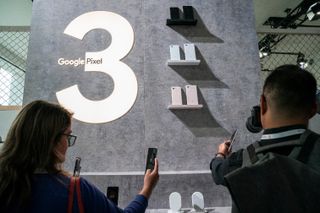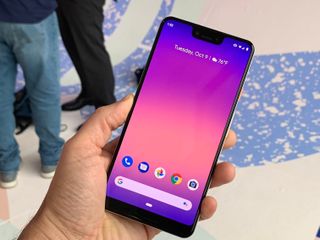The Pixel 3 Already Has One Big Flaw
The Pixel 3 and Pixel 3 XL look like two of the strongest flagship phones of the year, which makes Google’s continued exclusive partnership with Verizon a big head-scratcher.
There’s a lot that smartphone buyers should be excited about when it comes to the Pixel 3 and Pixel 3 XL, but Google is also bringing back the worst flaw for these sequels.

Lets start with the good news. The cameras on the new Pixels look smart enough to beat the iPhone XS and Galaxy Note 9. The Top Shot, Super Res Zoom and Night Sight features seem particularly impressive.
Google, which has never won raves for the look and feel of its phones, also deserves credit for figuring out how to offer a glass design in a matte finish. This prevents the back of your phone from being festooned with fingerprint smudges after 5 minutes. And the ability to screen calls with Google Assistant is a great use of AI.
MORE: Pixel 3 XL Hands-On Review: Pros and Cons
Unfortunately, Google doesn’t seem at all interested in getting the Pixel 3 and Pixel 3 XL in as many hands as possible. All you need to do is look at the company’s partners. Make that partner. Again.
For whatever reason, Verizon is once again the only major U.S. carrier who will sell the Pixel 3 and Pixel 3 XL. This exclusivity arrangement made more sense when Google was trying to prove itself with hardware on the Pixel and then Pixel 2, but not now. Not when nearly all the experts say Google offers the best camera phone.
Google is fighting the smartphone war against Apple and Samsung with one hand tied behind its back.
“I think the Pixel phones look outstanding as they did last year,” said Stephen Baker, vice president of industry analysis at NPD Group. “It’s very hard for Google to make a huge volume impact but the phones feel unique to me, which is kind of the point.”

There’s no question that the Pixel 3 and Pixel 3 XL look and feel unique, but Google is fighting the smartphone war against Apple and Samsung with one hand tied behind its back.
It also doesn't help that Verizon is charging $30 more for the Pixel 3 XL than Google is. Why? I have no idea.
Yes, Verizon has a large customer base, with more than 151 million subscribers. And based on our testing, it’s the fastest and most reliable network. But Google’s wrongheaded strategy also leaves customers who turn to AT&T (143.8 million subscribers), T-Mobile (75.6 million) and Sprint (53 million) on the table.
“Verizon is certainly a good partner, but I do not understand why Google is not selling at AT&T and T-Mobile as well.” - Avi Greengart, GlobalData
“The Pixel 3 and Pixel 3 XL are still effectively Verizon exclusives in the U.S., even though Google and Best Buy also sell them unlocked with support for all the other networks,” said Avi Greengart, research director for consumer devices at GlobalData. “Verizon is certainly a good partner, but I do not understand why Google is not selling at AT&T and T-Mobile as well.”
It’s true that you can buy the Pixel 3 or Pixel 3 XL unlocked, but most in the U.S. still don’t buy their phones that way. A just-released report from NPD found that unlocked smartphones account for an estimated 38 million customers — just 15 percent of the market.
That number is up from 30 million customers in 2017, and awareness levels of unlocked phones are at an all-time high of 74 percent. But the vast majority of phone shoppers still buy their devices through the Big Four carriers.
The bottom line is that there’s simply too many people who won’t be exposed to Google’s new phones. And that’s a shame for a company that has made such big strides toward becoming a major player.
Sign up to get the BEST of Tom’s Guide direct to your inbox.
Upgrade your life with a daily dose of the biggest tech news, lifestyle hacks and our curated analysis. Be the first to know about cutting-edge gadgets and the hottest deals.
Mark Spoonauer is the global editor in chief of Tom's Guide and has covered technology for over 20 years. In addition to overseeing the direction of Tom's Guide, Mark specializes in covering all things mobile, having reviewed dozens of smartphones and other gadgets. He has spoken at key industry events and appears regularly on TV to discuss the latest trends, including Cheddar, Fox Business and other outlets. Mark was previously editor in chief of Laptop Mag, and his work has appeared in Wired, Popular Science and Inc. Follow him on Twitter at @mspoonauer.

